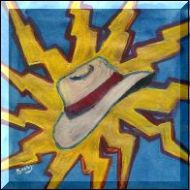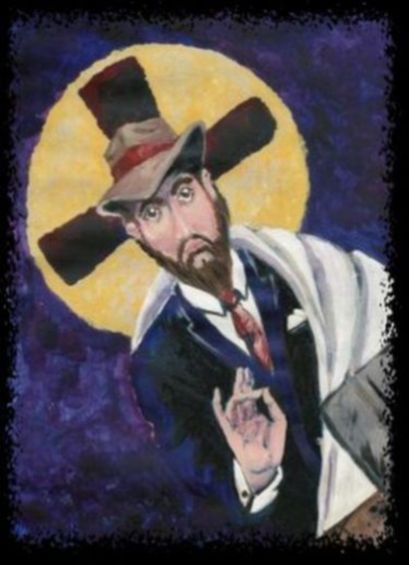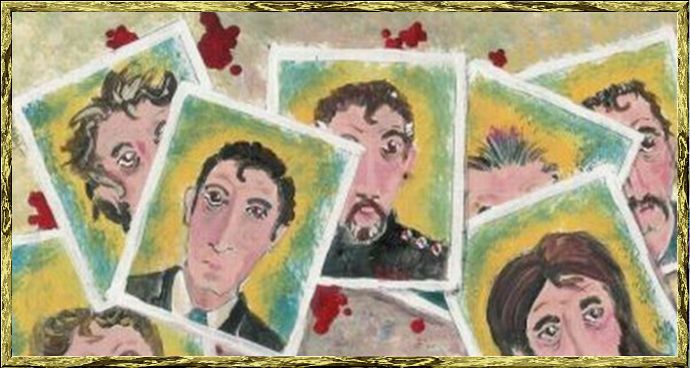

It was shaping up to be a quiet day when Officer Murtagh and Officer Garcia came knocking on my door. The PI business isn't all it's cracked up to be, especially not in Philly and especially not this week. With sniffers and true-tell and DNA logging, and most especially with the new divorce laws, I'd have been better off in home insurance. I'd have been better off, that is, if it wasn't for the glamour, and the best thing you can say for glamour is that it isn't religion. I was amusing myself that morning by rearranging the puters and phones on top of my desk and calculating how long it would be before I could afford to hire a beautiful assistant to sit in the outer office. I couldn't afford an outer office either; my door opened directly from the street. The answer had come out at fourteen thousand and seven years when the knock came. I couldn't wait that long, so I answered it myself.
They showed me their IDs straight off. I looked them over while pretending to read. Murtagh was a typical cop, solid muscle all through. His canine ancestry showed in his expression as well as his build. I'd put it at half bulldog and half terrier. Garcia, on the other hand, was thoroughly human and thoroughly female and gorgeous enough to bring an inertialess drive to a full stop. Unfortunately, I'd met her before.
They came in. I took my usual seat. Murtagh took the client's chair, which left Garcia perching on the side of the desk.
"So what can I do for you, Officers?" I asked. It's always good for people in my profession to keep on the right side of the law.
"Where were you last night at eighteen-thirty?" Garcia asked.
"Right here," I said.
"You work that late?" Murtagh asked, wrinkling his pug nose, skepticism practically oozing out of his pores.
"This is my home as well as my office."
Murtagh looked around pointedly.
Garcia took pity on me. "It's all nanogear. It doesn't always look like Sam Spade's office. The desk turns into a bed."
Murtagh looked at her like maybe he was wondering how she knew. With her long black hair and tight-fitting uniform I might just have wished that Garcia's knowledge of my bed was more than just theoretical, but as I said, I'd met her before. Murtagh decided to let it go for once.
"There's a Jesus been killed," he said, and watched me closely for a reaction.
He didn't get one. It didn't seem like front page news. Jesi get killed all the time. Goes with being pacifists, goes with being set to push a lot of buttons on a lot of religious nuts. He held the pause, so I asked: "How does this affect me?"
"You don't care?" Murtagh barked.
"Only in so far as no man is an island," I replied. "I guess the dead man was a brother, but—" I was going to say he was also a stranger. Garcia cut me off.
"Closer than a brother," she said. "More like another you, as I understand cloning."
"Still a stranger, as far as I know," I said, and shrugged.
About fifty years ago they got cloning straightened out. Nobody much bothered with it. Not as if there weren't already lots of people. Sure, some people had kids as little personal faxes to the future, but it wasn't common. It seemed a bit tacky somehow. It was more use for pandas and cheetahs who didn't get a say in it. Sure, some people mixed up superkids, and animal-ancestry kids like Murtagh, but most people just yawned and pushed the next button.
About forty years ago some idiot had the bright idea of taking some of the DNA from a blood-stained handkerchief in a church in Greece and producing a genuine certified clone of Jesus. There was uproar, as you'd expect, and the uproar was only calmed down a little when they said they'd give the clones to anyone who wanted one, free of charge, every church and every family can have their own Jesus. A lot of people did, a surprising number of people, enough so that soon having a baby Jesus of your own wasn't all that interesting or unusual. In fact, it was a fad. Being a Jesus, well, that was another thing. To start with, for the first few, everything we did was news. Jesus suffers little children. Jesus cuts hair, Jesus works in gas station. By the time I was growing up, Jesi were pretty much just like any other ethnicity, only with fewer women and no cuisine. There were hundreds of thousands of us in the U.S. alone. People argued about whether the DNA was really that of Jesus, people argued about heredity versus environment, people argued about whether we were the Antichrist or the Second Coming. Churches took positions, Jesi took positions. I tried to stand somewhere well away from all the positioning. I kept my hair short and my face shaved and me well out of it. If you have to have a personal role model, I think Sam Spade is better than Jesus Christ any day.

"You're theoretically a suspect," Garcia said quietly.
This truly surprised me. Sniffers can tell who's moved through an area for hours afterwards. Tasters keep photographs and air samples, and with universal logging of DNA it's really hard to actually get away with a murder these days. "Murder suspect" seemed like a very old fashioned concept. Crime, and detection too mostly, had moved online. Then I got it. It took longer than it should have.
"Your dead Jesus was killed by another Jesus?"
Garcia grimaced. Murtagh nodded. "You're the only Jesus on record who's ever killed anyone."
"Hell, Garcia, you know about that."
Garcia tapped her fingers on my screen and brought up a record. She shouldn't have been able to do that, but I didn't object. "Like I said," she said to Murtagh. "He did it to save himself and me. He was a split-second ahead of the villain."
Villain was another old-fashioned word, but it didn't sound strange on Garcia's lips, not when referring to Kelly. Kelly, Turrow and Li had robbed a client of mine of a large amount of money, and Garcia was working on them too. She'd come to see me and we'd agreed to cooperate. We'd worked together so well. I still didn't like to think about it.
"I had a license for the gun," I said.
"There wasn't any question," Garcia said.
We'd gone in side by side. I'd shot Kelly. She'd shot Turrow and Li without hesitation. Kelly had been coming at us with a gun in her hand. Turrow and Li were sitting at their puters. Li was off in virtual. She hadn't even moved.
"You're still the only Jesus on record who's ever killed anyone," Murtagh said. "Jesi are always getting killed. A Jesus killing is something new. So, what made you do it?"
"Save my life. Save hers," I said. I've thought about it since, but I didn't think at all at the time. I saw the gun coming up and squeezed my own trigger. What was Kelly's life compared to Garcia's, or even mine? So what if it was casting the first stone? Kelly was coming right at us. One shot, one death. I couldn't have done what Garcia did, and taken out the others.
"Well this wasn't any case of self-defense," Murtagh said.
"There are what, a couple of thousand Jesi in Philly?" I googled around and got an answer right away, 2912. "Others could have flown in, or come by train, hell, even landed at the spaceport. I can't prove it wasn't me, but in the same way I don't see how you can prove it was." They couldn't use truth-tell unless they had a court order, or unless I volunteered. Fifth Amendment.
"It wasn't you," Garcia said. "The sniffers outside this building show that you came in yesterday and didn't leave again."
"Then why are you here?"
"We wanted your help. Your psychological insight into Jesi, the insight of a Jesus who became a private investigator and who killed in self-defense, into which of the suspects it could have been. If we had a good idea we could get a truth-tell, but we can't just ask to pump it into the lot of them. The lawyers of all the innocents would scream blue murder." Garcia crossed her legs and bit her lip. "Will you help us?"
"Will you pay my professional rates?"
"Hey—" Murtagh growled, but Garcia cut him off.
"We'll pay your professional rates. Jesus!" I couldn't tell if she was calling me by name or swearing.
"So, tell me about the suspects."
"Well, the taster records are just about useless, as the DNA all comes up as just plain Jesus," Murtagh said. There are second generation Jesi now, kids of the originals, not clones, who would show up as a Jesus-mix, same as Murtagh would show as a dog-mix. "But the sniffers let us narrow it down to six individuals who were in the street at the right time."
"Tell me about them."
"First, let me tell you about the murder. The dead man is Alambert Jesus," Garcia said. "You heard of him?"
"The writer," I said. He was a bestseller, and probably Philly's best known Jesus. I hadn't read any of his books. They looked to be several gig thick, and I don't have much time for reading.
"Lots of you have writing talent. It seems to be genetic. Come to that I guess the parables are pretty good short stories," Murtagh said.
"I save my skill in that direction for writing up my cases."
Murtagh gave a little barking laugh.
Garcia went on. "Well, Alambert Jesus lived in Chinatown. He was home. He opened the door to a Jesus. The Jesus tortured him to death, slowly. Then the Jesus left."
"Tortured him? That doesn't make sense."
"Doesn't, does it?" Murtagh sighed. "Doesn't go with the pacifism and thou shalt not kill stuff."
"Maybe this one came to bring a sword," Garcia suggested, looking at me.
I had enough of that in my childhood. "Whoever we're clones of, and as far as I'm concerned Jesus is just shorthand for the person whose blood was on that handkerchief, I think there are enough of us for you to be able to tell that we're the same in some ways and different in others without getting religion into it."
"You don't think religion has anything to do with the murder?" Murtagh asked.
"Was he crucified?" I asked.
"Interesting guess," Garcia said. "But while I hear that happens a lot in the South, no. Alambert was not crucified."
"Then it probably wasn't religious."
"The suspects," Murtagh said, getting a look in his eye like he was on the trail. "These are the ones who were on the spot right after. Let me run through them quickly." As he named them he brought their faces up on my screen, one pair of soulful brown eyes after another, different arrangements of hair and clothes. All of them could have been my brothers. Or me. "Jesus Potrin, 28, local radio talk show host. Only suspect who actually knew Alambert. They weren't close friends, but he'd had him on the show. Jesus Dowell, 18, down-and-out. No known connection. Alex Jesus Feruglio, 35, chef at Joseph Poon's, on Arch. Alambert ate in there occasionally. Joshua Jesus, 33, minister of the Church of the Second Coming. No known connection. Karl Jesus, 26, motor mechanic, no known connection. Malcolm Jesus Zimmerman, 29, doctor from Montana, in town for a convention. No known connection."

"Jesus, they really do have nothing in common except their genes," Garcia said. This time I was sure she was swearing.
"I don't know any of them either," I said. "I've eaten in Joseph Poon's, but who hasn't?" It was the best fusion food in town.
"Nothing jumps out at you?" Garcia asked.
"Not immediately. They all had the opportunity. The method's obvious. The problem is motive. I'll poke about on line and see what I can find in their biographies, but I'm not hopeful." Why would any of them kill Alambert? Why would a Jesus kill another Jesus? What could they possibly get out of it?
"Well, Jesus or not, we'll catch them, and whichever of them it was will fry for it," Murtagh said, getting up.
"Though what that will do with public opinion I don't know," Garcia said.
"It must have been Joshua Jesus," I said, as the pieces came together. "Don't execute him. That's what he wants."
Murtagh sat down again. "That's what he wants? Explain."
"That's his motivation. He's a millenarian, a religious nut, a priest of the Second Coming and he thinks he's it. He's thirty-three, the age Jesus was when he was crucified. He must have picked this as a sure way of being executed by the state."
"A nut," Garcia said. "A religious fanatic."
"True-tell will get it out of him, and you ought to be able to get an order. You can put him in a nuthouse and throw away the key," I said.
"Huh," barked Murtagh. "Coming, Garcia?"
"I'll just be a moment," she said.
Murtagh stepped outside.
"You're not a religious fanatic," she said.
"There are possibilities in the genes, not predestination," I said. "I'm not a writer or a chef either. There's more to me than my genes."
"And there's more to me than my trigger finger."
We looked at each other, a little wary, a little uncertain, but damn she was beautiful and even more than a beautiful assistant and an outer office I needed a partner. "Blessed be the trigger happy," I said, and she was in my arms.
Sometimes in this life you've just got to ask yourself: "What would Sam Spade do?"
Jo Walton is the author of several novels and short stories.